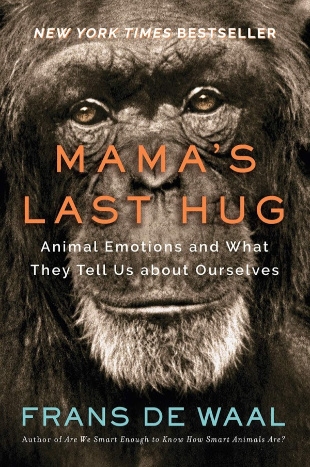"For me, the question has never been whether animals have emotions, but how science could have overlooked them for so long. It didn't do so originally — remember Darwin's pioneering book — but it certainly has done so recently. Why did we go out of our way to deny or deride something so obvious? The reason, of course, is that we associate emotions with feelings, a notoriously tricky topic even in our species. Feelings happen when emotions bubble to the surface so that we become aware of them. When we are conscious of our emotions, we are able to express them in words and make others aware of them: they see emotions in our face, but they get the feelings from our mouth. We say we are 'happy' and people believe us, unless of course they can see for themselves that we're not. Sometimes a human couple acts as if they were happy but then divorce a month later. People close to the pair probably knew. If not, they will wonder how they could have missed the signs. We are very good at separating reported feelings from visible emotions, and we generally trust the latter better than the former.
"The possibility that animals experience emotions the way we do makes many hard-nosed scientists feel queasy, partly because animals never report any feelings, and partly because the existence of feelings presupposes a level of consciousness that these scientists are unwilling to grant to animals. But considering how much animals act like us, share our physiological reactions, have the same facial expressions, and possess the same sort of brains, wouldn't it be strange indeed if their internal experiences were radically different? Language is irrelevant to this question, and the size of our cerebral cortex is hardly a reason to propose a difference. Neuroscience has long ago abandoned the idea that feelings arise there. They come from much deeper inside the brain, the parts closely connected to our bodies. It is even possible that feelings instead of being a fancy by-product, are an essential part of the emotions. the two may be inseparable. After all, organisms need to sort out which emotions to follow and which ones to suppress or ignore. If becoming aware of one's own emotions is the best way to manage them, then feelings are part and parcel of the emotions, not just for us but for all organisms.
"But all right, for the moment all this remains speculation. Feelings are clearly less accessible to science than emotions. One day we may be able to measure the private experiences of other species, but for the moment we have to content ourselves with what is visible on the outside. In this regard, we are beginning to make progress, and I predict that a science of the emotions will be the next frontier in the study of animal behavior. While we are well under way in discovering all sorts of new cognitive capacities, we need to ask what is cognition without the emotions? Emotions infuse everything with meaning and are the main inspiration of cognition, also in our lives. Instead of tiptoeing around them, it's time for us to squarely face the degree to which all animals are driven by them."
